WHAT‘S HAPPENING
News & Events
SAFC celebrates International Day of People With Disability
03 December 2021
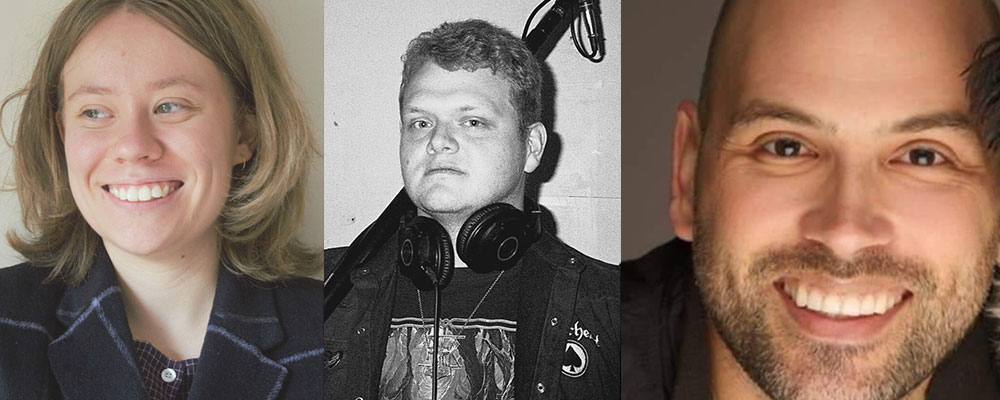
Today is the International Day of People with Disability (IDPWD), a United Nations observed day that aims to increase public awareness, understanding and acceptance of disabled people, and celebrate their achievements and contributions.
The SAFC is committed to improving representation in our screen content and inclusion and diversity in our sector. We value ensuring access and equality for all practitioners across the screen sector, and we align to the guiding principles of the United Nations Convention on the Rights of Persons with Disability, including respect, equality and non-discrimination.
To celebrate IDPWD 2021 the SAFC is proud to highlight three outstanding South Australian screen creatives: Madison Siegertsz, Aiden Marks and Michael Costalos.
Madison Siegertsz
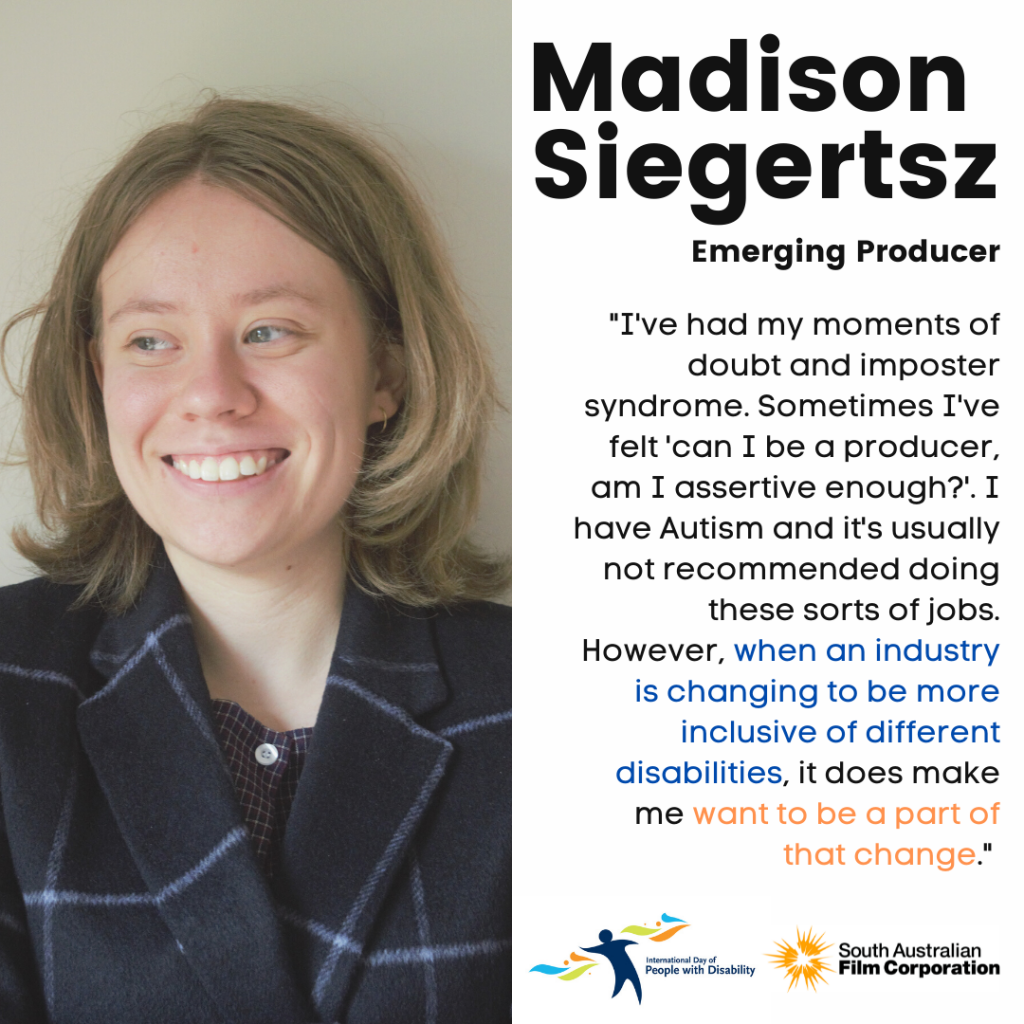
Madison Siegertsz is an emerging independent South Australian producer, and recent graduate of the SAFC’s Skilling SA screen workforce training program.
She has worked on feature films, television, and commercial productions in various crew roles, and at the age of 22 developed and ran youth chat show Couch 44 for SAFC partner organisation Adelaide community broadcaster Channel 44.
Madison is passionate about the representation of neurodiverse communities on screen. Her goal is to pursue a career in producing television and unscripted content that can make a positive impact and contribute towards nurturing a new generation of filmmakers that accurately depict and give voice to Australia’s multicultural, LGBTQIA+ and neurodiverse communities.
“Film has a magic ability to allow us to escape our lives for a brief moment. Since a young age, I’ve always wanted to find a creative outlet – I’ve tried painting, jewellery making, drawing. Everything. After doing more research, I realised that I enjoyed more of the organisational aspect of filmmaking; putting a team together and planning day-to-day operations,” she says.
“Of course, I’ve had my moments of doubt and imposter syndrome. Sometimes I’ve felt ‘Can I be a producer, am I assertive and capable enough to be?’. I have Autism and it’s usually not recommended to do these sorts of jobs when you have the condition, but the SAFC is a supportive bunch of people that have helped me along the way, especially during the SA Skilling program.
“When an industry is changing to be more inclusive of different disabilities, it does make me want to be a part of that change. The first part of that change is to tell people I do have autism and I want to show people that anyone, no matter their circumstance, can aspire to do whatever they want.“I think we still have a long way to go in terms of an authentic representation of Autism on screen, especially as Autism is a spectrum, but I think the most respectful is Pixar’s SparkShort ‘Loop’ (2020) directed by Erica Milsom. I would say though, it would be amazing if we could see more screen stories about high-functioning Autistic characters navigating life.”
Aiden Marks
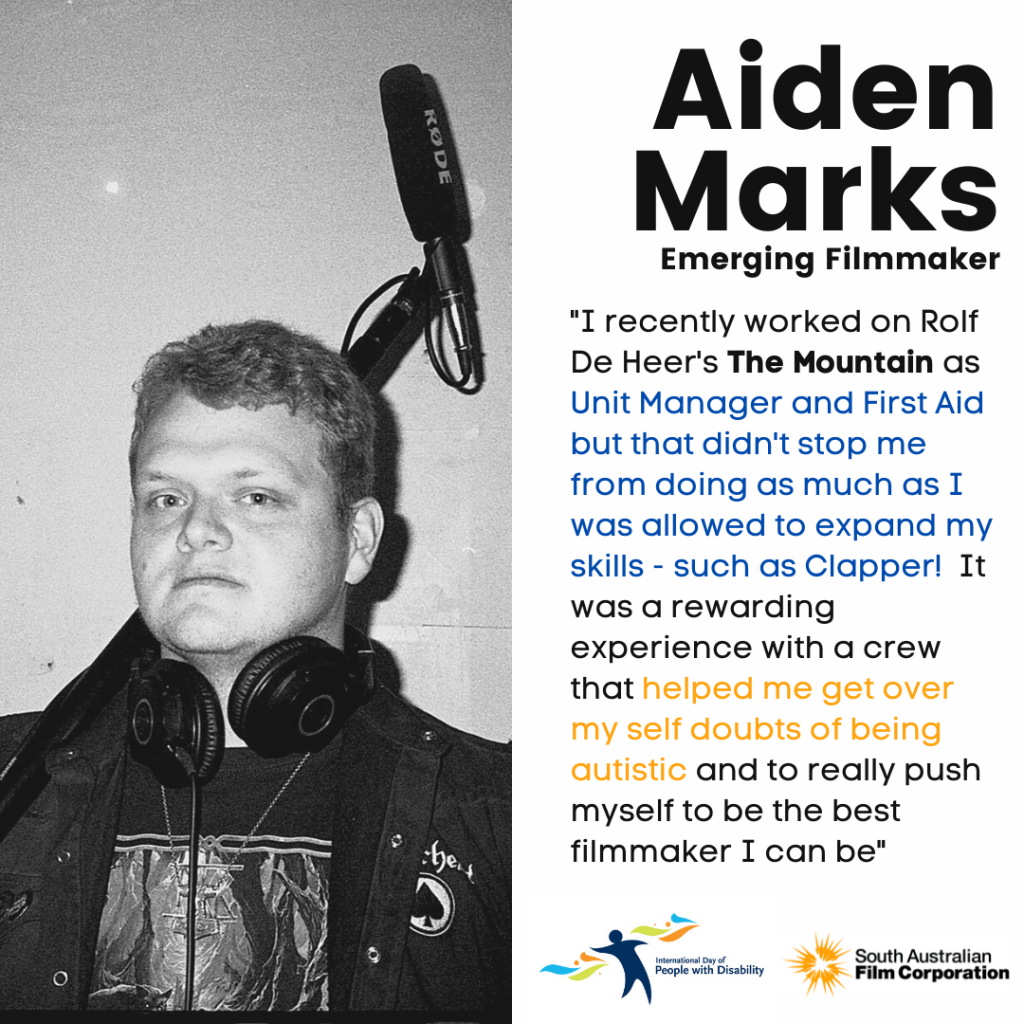
Aiden Marks is an emerging filmmaker who is currently honing his skills through the SAFC and Mercury CX Master Apprentice Program, a skilling and training initiative that pairs experienced South Australian Heads of Department (HODs) with up-and-coming crew members for mentoring and professional networking.
Aiden has worked in various crew roles over the past five years, most recently working on Rolf De Heer’s feature The Mountain as Unit Manager and First Aid, web series Blood Money as DOP and Assistant Director, and feature Ribspreader as a Sound Recordist/Boom Operator and runner and as Director, Writer, and DOP of Channel 44 production Late Night Flick.
“International Day of People With Disability gets our voices out there, and shows the world what we love, who we are and why we do many great things – from art, screen and media to tradie work,” he says.
“It helps show what we truly love and wish to pursue in our lives and that we are as normal as anyone else -for the most part! I recently worked on Rolf De Heer’s The Mountain as Unit Manager and First Aid but that didn’t stop me from doing as much as I was allowed to expand my skills – such as Clapper! It was a rewarding experience with a crew that helped me get over my self doubts of being Autistic and to really push myself to be the best filmmaker I can be.
“The impossible is possible in filmmaking and that is what I truly take note of, but I also take a view on how different outcomes of a story have progressed and the world in which the story is set can be very different from our own.
“My favourite example of authentic representation of disability on screen is honestly Dan Aykroyd’s Ray Stantz in Ghostbusters. While the character hasn’t been said to be Autistic, Aykroyd has said that he has been diagnosed with Autism and since he wrote the story and characters, I feel that his character was very much based on him personally – being knowledgeable with what he loves, being clueless to many social norms, pushing himself to follow his dreams, and becoming a stronger character around his closest friends. We all need someone like Ray Stantz/Dan Aykroyd in our lives.”
Michael Costalos (and Finn)
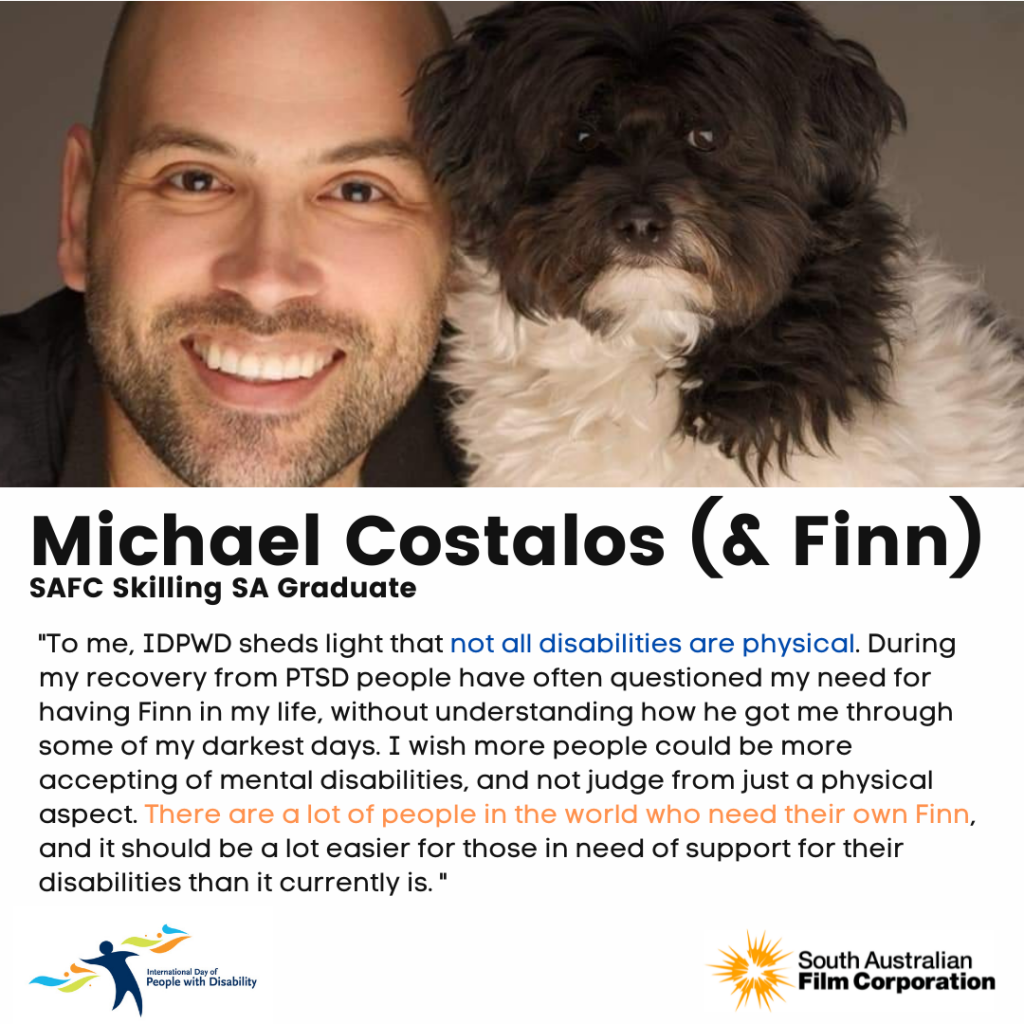
Michael Costalos is a qualified financial planner who recently made his first move into the screen industry through the Skilling SA screen workforce training program, where he learned all about the skills required to be a Production Accountant. The program welcomed newcomers and existing crew to upskill in areas of critical skills shortage in the screen industry.
Michael is passionate about film and TV, and is looking forward to finding a role in the screen industry for both himself and Finn.
“To me the International Day of People with Disability sheds light that not all disabilities are physical,” he says.
“During my recovery from PTSD, people have often questioned my need for having Finn in my life, without understanding how he got me through some of the darkest days of my life. I wish more people could be more accepting of mental disabilities, and not judge from just a physical aspect. There are a lot of people in the world who need their own Finn, and it should be a lot easier for those in need of support for their disabilities than it currently is in Australia unfortunately.
“During the recovery from my injuries and PTSD, as a result of the car accident I was involved in, film and TV became a passion for me, so much so that I was watching at least one movie per day and an entire TV series each week! As such, after seven years of rehabilitation, I applied for the SAFC Skilling SA program and got accepted. I’ve only recently just completed the training and am looking for a role in the industry that would allow Finn and I to return to work.
“My favourite example of authentic representation of disability on screen is Jeff Bridges as Max Klein in Fearless. The screenwriter wrote the script after he was involved in a car accident himself. Although Max looks perfectly fine on the outside, it’s the PTSD symptoms inside that are affecting his life and the lives around him. Through time and the journey he needed to take, he ends up recovering his emotional connection to his family, to the world and to the reality of yet another chance at life.”
Learn more about the SAFC’s commitment to supporting Deaf and disabled screen practitioners in our Disability Screen Strategy.
